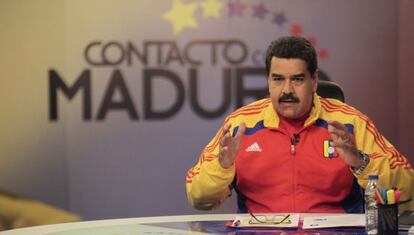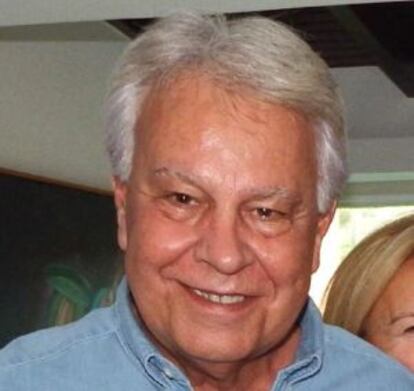Venezuela demands answers from Colombia after ex-PM flown out on jet
Maduro accuses Felipe González of meeting with “extremist groups” who want to oust him

The Venezuelan government has demanded explanations from Colombia as to why former Spanish Prime Minister Felipe González left the country on Tuesday aboard a Colombian air force jet, which took him to Bogota.
In a televised address, President Nicolás Maduro reiterated his claims that an international conspiracy between Bogota, Madrid and Miami is trying to oust him from power, with González presumably taking the lead role.
Maduro reiterated his claims that an international conspiracy is trying to oust him from power
“The foreign ministry has called in the [Colombian] ambassador [for explanations],” the Venezuelan president said.
In the past, Maduro has alleged that a right-wing conspiracy in the three cities is joining forces to organize a coup against his government. He has even accused the Spanish government of Prime Minister Mariano Rajoy and his supporters of being behind the plot.

On Tuesday, González suddenly left Venezuela after he was denied permission to visit jailed opposition leader Leopoldo López, who is on a hunger strike at Ramo Verde military prison outside Caracas, where he has been held since February 2014 on conspiracy and sedition charges.
González arrived in Caracas on Sunday with the aim of joining the defense teams of López and Caracas Mayor Antonio Ledezma, who was also jailed earlier this year, but the Venezuelan government had warned the former Spanish prime minister that it would be impossible.
“I have been closely watching the failed visit of this person whom the Spanish people detest – Mr Felipe,” Maduro said during a broadcast of a program about transport systems.
González suddenly left Venezuela after he was denied permission to visit jailed opposition leader López
Maduro’s own weekly show, “In contact with Maduro,” was canceled this week due to a flu virus the president reportedly has, and which apparently kept him from traveling to Rome this past weekend to meet with Pope Francis.
The Colombian government of Juan Manuel Santos said in a statement that it sent an air force jet to pick up González, who later met in Bogota with the president and peace negotiator Humberto de la Calle, who is holding talks in Havana with the Revolutionary Armed Forces of Colombia (FARC).
“The main subject of the meeting was the peace process in Colombia and the upcoming Community of Latin American and Caribbean States (CELAC)-European Union summit,” which gets underway on Wednesday in Brussels, the statement said.
González met in Bogota with President Santos to discuss the Colombian peace process with the FARC
No mention was made about the events that prompted the former Spanish prime minister’s sudden departure from Caracas.
“The former prime minister has been a true friend of Colombia and a big supporter of the peace process,” the statement said.
González’s departure was secret until Maduro and several Venezuelan lawmakers revealed that he left on a Colombian air force jet.
After meeting with opposition leaders on Monday, González had said that he would not pressure the Venezuelan government if he wasn’t granted permission to hold talks with López at the military jail. The Spanish Socialist was able to hold a brief meeting with Ledezma, who is under house arrest while he recovers from surgery for a hernia.
González publicly called for dialogue between the opposition and the Maduro government.
“In the eyes of all Venezuelans, [González] left the so-called opposition, as well as the conservative right wing, in bad shape,” Maduro said.
“He came over here to support extremist groups who are trying to oust me from power. Really, it is an embarrassing and pitiful situation. Actually, we are indignant.”
Tu suscripción se está usando en otro dispositivo
¿Quieres añadir otro usuario a tu suscripción?
Si continúas leyendo en este dispositivo, no se podrá leer en el otro.
FlechaTu suscripción se está usando en otro dispositivo y solo puedes acceder a EL PAÍS desde un dispositivo a la vez.
Si quieres compartir tu cuenta, cambia tu suscripción a la modalidad Premium, así podrás añadir otro usuario. Cada uno accederá con su propia cuenta de email, lo que os permitirá personalizar vuestra experiencia en EL PAÍS.
¿Tienes una suscripción de empresa? Accede aquí para contratar más cuentas.
En el caso de no saber quién está usando tu cuenta, te recomendamos cambiar tu contraseña aquí.
Si decides continuar compartiendo tu cuenta, este mensaje se mostrará en tu dispositivo y en el de la otra persona que está usando tu cuenta de forma indefinida, afectando a tu experiencia de lectura. Puedes consultar aquí los términos y condiciones de la suscripción digital.









































